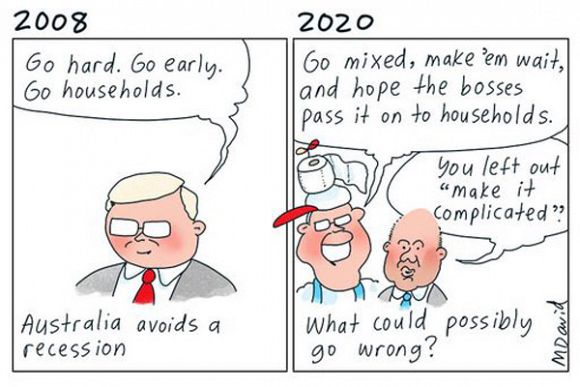Technological advancements brought on during the COVID-19 pandemic need to be recognised by the Government to restore the economy, writes Professor John Quiggin.
OVER THE COURSE of the 21st Century, Australia’s society and economy have undergone a process of radical transformation. Many aspects of this process will be accelerated by the COVID-19 pandemic and the necessary responses.
Unfortunately, government responses so far have been a backward-looking document that takes almost no account of the transformation of the 21st-Century economy by information technology, let alone of the radical change in our circumstances created by the COVID-19 pandemic. The Morrison Government’s COVID-19 Commission has been rightly criticised for its focus on fossil fuels. Sadly, the Queensland Economic Recovery Strategy is little better
Technological change, particularly in information technology and communications, has rendered the 20th-Century industrial economy, focused on transforming primary products into manufactured goods, obsolete. In its place is an emerging knowledge economy in which the capacity to manage and use information will be crucial.
In particular, the rise of various forms of remote work will reduce the importance of transport and transport infrastructure, which played the leading role in the rise of the industrial economy. Information technology and remote work have played a crucial role in our capacity to manage the pandemic.
Environmental challenges, of which the most significant relate to global warming, have created the need for a radical transformation of the energy sector. If catastrophic global warming is to be avoided, the economy must be completely decarbonised by 2050. The leading sector in this respect is electricity generation, where the imperative is to end coal-fired power generation by 2030 in EU and OECD countries and by 2040 globally. In the course of the pandemic, the use of coal-fired electricity has dropped sharply, while investment in renewables has risen.
Finally, the dominant economic ideology of the late 20th Century, based on market-oriented reform, has proved ill-suited to the needs of the 21st Century. Recovery from the Global Financial Crisis was still incomplete when the pandemic emerged, necessitating a massive increase in government intervention to rescue the economy. In particular, wage growth remained sluggish and interest rates were at or near zero in most countries. A return to the conditions seen as normal before the GFC will not take place for some years, if it ever happens.
Related Articles
If we are to manage our recovery from the pandemic, it is critically important for national and state governments to re-examine basic assumptions about how the economy works now and will work in the future. The central focus of this re-examination must be on the radical changes implied by the pandemic for our economy and society.
These changes will be particularly acute in relation to health and social services, education, the environment, tourism and recreation and in relation to the way we work, including the security of employment, remote working and non-market work.
But the Queensland Economic Recovery Strategy shows no awareness of this. The strategy begins with a list of “traditional strengths” consisting mostly of industries that were major employers in the 20th Century, but are now peripheral in this respect.
According to the 2016 Census, resources, manufacturing and agriculture account for 11 per cent of total employment between them, compared to 13 per cent for health care and social assistance — the largest single sector and the one most directly affected by the pandemic. The list of emerging strengths follows the same pattern, focusing almost exclusively on minerals and energy.
In the absence of a fully effective vaccine, it is likely that our health care sector will require a substantial expansion, with a permanent increase in capacity for public health functions such as testing, screening and contact tracing. We will also require expansion of a wide range of social services to deal with various forms of economic, social and psychological distress arising from the pandemic.
Given the likelihood of regular school closures and the possibility of future lockdowns, the development of initiatives to improve online learning, manage disrupted education and protect students and teachers from pandemic illness is of crucial importance.
Retail trade is also likely to undergo radical transformation, including, for example, an accelerated shift to online shopping and home delivery. The shift to remote working and online service delivery implies a fundamental realignment of our way of work and life, with communication replacing travel across a wide range of activities.
These are just some of the issues that need to be addressed in the context of a response to the current crisis. So far, there is little sign that governments have recognised this.
John Quiggin is Professor of Economics at the University of Queensland and the author of 'Zombie Economics and Economics in Two Lessons'. You can follow John on Twitter @JohnQuiggin.
 This work is licensed under a Creative Commons Attribution-NonCommercial-NoDerivs 3.0 Australia License
This work is licensed under a Creative Commons Attribution-NonCommercial-NoDerivs 3.0 Australia License
Support independent journalism Subscribe to IA.















